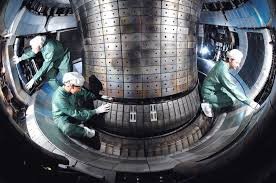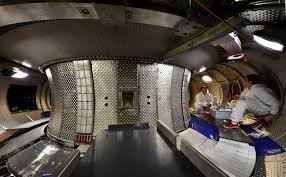
Hi dear steemians and hello dear friends. This time I am back again with some sciece based content, to be more specific content about fusion. If this is what you want, upvote and follow. I will certainly appreciate it.
Today, the post is again not a part of the Guide to Fusion because this will be more of an overview type of post, but you are more than welcome to visit the linked post, as it serves as a table of content to the previous fusion related content. In this post we will answer the question: How exactly do various types of experimental setups contribute to our knowledge of future ITER operation?
Why do we need other experiments?
For this question to be answered we must pose another question. Other fusion tokamaks which are able to ignite a fusion plasma already exist and are strewn all across the world.
Joint European Torus (JET) situated in the UK, JT-60 in Japan, so-called ASDEX Upgrade which is operating near Munchen, Germany. You can see ASDEX Upgrade in the right picture. It is a much smaller machine than ITER will be. But why does that matter? It matters because the power output of a tokamak type reactor strongly depends on the plasma volume size. This means that smaller tokamaks are simply not physically able to produce the amount of energy that is relevant considering the needs for power output in a commercial reactor, and larger tokamaks are needed. So now we can finally answer the question what is the role of the smaller scale experiments.
Well the answer is quite simple. The plasma-wall interaction which is the most important scientific problem in future tokamaks is strongly dependent on power output. For instance, the heat flux that is transfered from the plasma to the divertor of the tokamak is in close relation with the power generated in the plasma. This means that without building ITER we have no way of having any clue what will happen in it. So the cause seems lost... What can we possibly do? Well here the smaller experiments come into play. They probe the underlying physics at smaller experiments, which can than be extrapolated to larger machines.
So lets look at two of the most prominent experiment types that are used for extrapolation.
Small tokamaks
I have already mentioned some tokamaks that exist currently. There are many more I have not mentioned yet. All of the tokamak have their own strengths and weaknesses. For instance. JET situated in the UK is the largest tokamak to have ever been built. This means it can come the closest to the future conditions which will be present in ITER in the plasma center. On the other hand the plasma-facing components and the structure of the divertor is constructed differently than in ITER, which means that the plasma-material interactions are not as relevant.
Another great example is the so-called WEST which can be seen in the picture above. This tokamak is constructed from exactly the same plasma-facing components than ITER. Also it produces relevant magnetic fields to those of ITER. All of this means that it can produce very high heat fluxes on specific targets in the diveror, by focusing the plasma on one spot. This means it is very relevant in the whole plasma-material interaction story and it complements JET very well.
Other tokamaks of course exist with their own strengths but I will not mention them here.
Plasma guns
I will only briefly mention the other possible experimental setup - so-called plasma guns. I intend to write about them in more detail sometime in the future. I will only mention that they are perfect experiments where it comes to investigating the plasma-material interaction, as the plasma parameters are quite easily changed. Also the fluxes of ions and heat can be extremely relevant for ITER. They can also quite easily change the conditions of the wall, by changing the samples, heating the samples, tilting the surface and so on.
The only real disadvantage is that the plasma is sometimes quite unreliable and can be contaminated. Which can be a problem or not, depending on your experiment.
Bellow I show a video made by a plasma gun set-up called Magnum-PSI, where a ITER relevant mono-block was exposed to unstable plasmas which mimic the ELM conditions, which I presented in my stellarator post

source
Possible problems
As we said the smaller experiments can probe the underlying physics that will come into play in the big ITER machine. This seems completely logical. You might think what is the problem, even. By using data gathered from small scale experiment physics you should be perfectly able to simply extrapolate to the bigger machine. Physics is physics, right? Well, not necessarily. It might be that at the extreme conditions with massive heat and particle fluxes some unlinear effects might come into play, which would make our extrapolation from current experiments completely pointless. But this is the best we can currently do. We simply must wait for ITER to be constructed and then see. This is the depressing physics reality.


StemQ Notice: This post was originally submitted on StemQ.io, a Q&A application for STEM subjects powered by the Steem blockchain.


I really like this kind of post; thank you so much for taking the time to develop it!
Unfortunately, sometimes I'm a little thick.
What is ITER?
Iter is the first experimentao reactor that will achieve 10 times the power output conpared what power is coming in. I suggest you read my previous posts. I exolain everythin there.
Hi, @maticpecovnik!
You just got a 1.61% upvote from SteemPlus!
To get higher upvotes, earn more SteemPlus Points (SPP). On your Steemit wallet, check your SPP balance and click on "How to earn SPP?" to find out all the ways to earn.
If you're not using SteemPlus yet, please check our last posts in here to see the many ways in which SteemPlus can improve your Steem experience on Steemit and Busy.
Congratulations,
you just received a 12.58% upvote from @steemhq - Community Bot!
Wanna join and receive free upvotes yourself?

Vote for
steemhq.witnesson Steemit or directly on SteemConnect and join the Community Witness.This service was brought to you by SteemHQ.com
Hi @maticpecovnik!
Your UA account score is currently 2.863 which ranks you at #11674 across all Steem accounts.
Your rank has improved 28 places in the last three days (old rank 11702).Your post was upvoted by @steem-ua, new Steem dApp, using UserAuthority for algorithmic post curation!
In our last Algorithmic Curation Round, consisting of 213 contributions, your post is ranked at #110.
Evaluation of your UA score:
Feel free to join our @steem-ua Discord server
Congratulations @maticpecovnik! You have completed the following achievement on the Steem blockchain and have been rewarded with new badge(s) :
Click here to view your Board of Honor
If you no longer want to receive notifications, reply to this comment with the word
STOPTo support your work, I also upvoted your post!
Do not miss the last post from @steemitboard:
This post has been voted on by the SteemSTEM curation team and voting trail in collaboration with @utopian-io and @curie.
If you appreciate the work we are doing then consider voting all three projects for witness by selecting stem.witness, utopian-io and curie!
For additional information please join us on the SteemSTEM discord and to get to know the rest of the community!
Hi @maticpecovnik!
Your post was upvoted by Utopian.io in cooperation with @steemstem - supporting knowledge, innovation and technological advancement on the Steem Blockchain.
Contribute to Open Source with utopian.io
Learn how to contribute on our website and join the new open source economy.
Want to chat? Join the Utopian Community on Discord https://discord.gg/h52nFrV